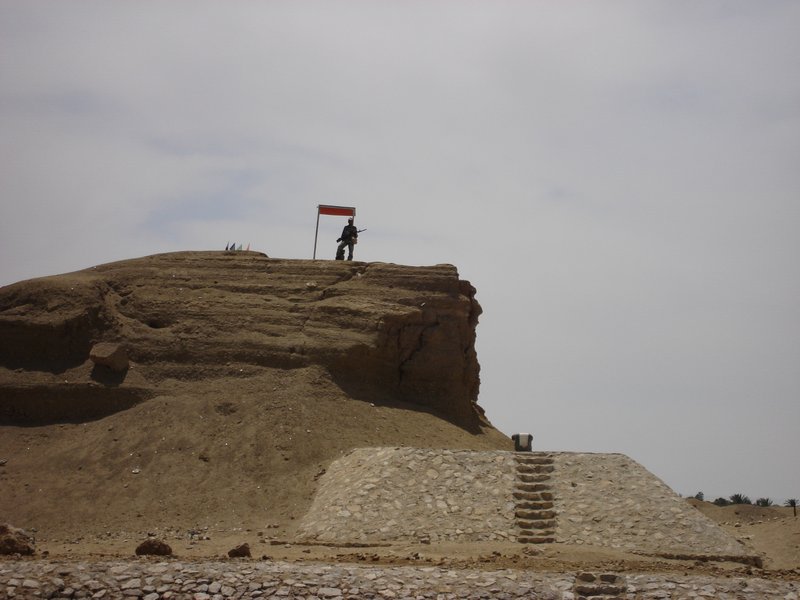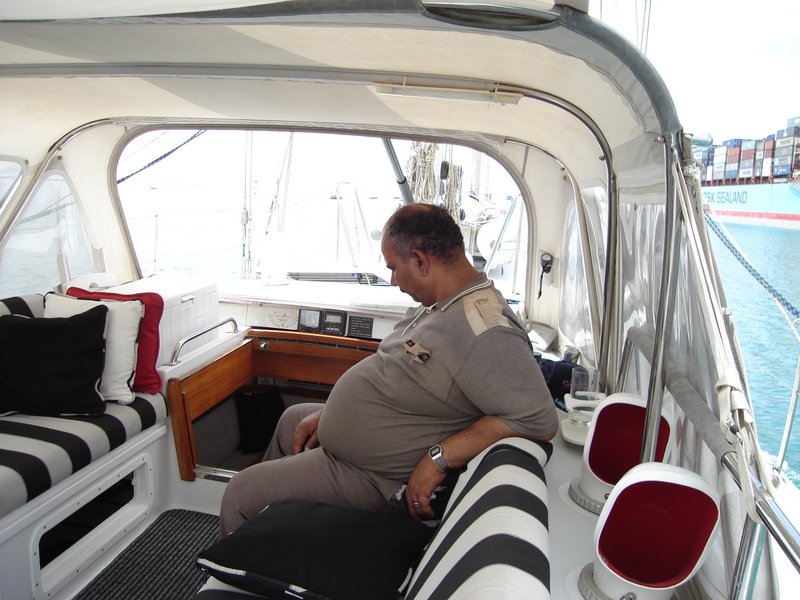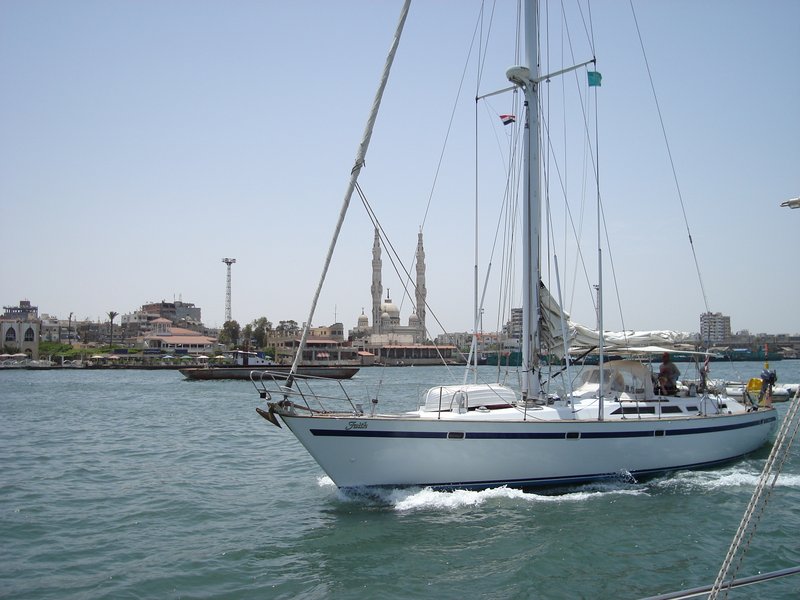26 May
Approach to the Suez Canal was pretty straight forward. The channel is well marked, and with dozens of ships anchored to each side, it looks a bit like the driving lane through a massive liquid parking lot. We arrived in the Suez Yacht Club basin and were welcomed by Captain Heebi, our canal transit agent, and another fellow called Said who assisted us with tying up Moonshadow between two moorings buoys. The “Yacht Club” is owned by the Suez Canal Authority and while it lacks most of the amenities of interest to cruisers, it is a convenient staging point for pleasure yachts transiting the canal.
It is also a convenient focal point for local tour guides, boat boys and others offering good and services, or just plain begging, to come out and regularly pester the transiting yachts.
Captain Heebi came aboard and briefly explained what needed to be done in preparation for our transit of the Canal. I asked him a few questions about the transit process, dealing with the pilots and other issues we’d heard and read about, and the all important tipping issue. He filled me in on everything to my satisfaction. Next he made a quick girth measurement of the boat, and after a plugging this number into a formula on his calculator, gave us a rough estimate of our transit fees, check out fees, berthing fees, agents fees, etc. He was incredibly organized and efficient. We took care of the business and shortly afterwards, one of the boys from the yacht club came by with a box of delicious pastries and a papyrus painting as a souvenir of Egypt.
We were later informed that we would have to wait until Monday to begin our transit, as there was a British (Coalition) warship transiting the next day, and pleasure yachts were not permitted in the canal at the same time as warships due to the risk of terrorism. Apparently Al Qaeda would like nothing more than to sink a war ship in the middle of the canal and close off this vital shipping link, and the word is they’ve made a few attempts, a fact that the Suez Canal Authority, would prefer that the rest of the world didn’t know.
27 May
We took advantage of the lay day and caught up on some maintenance, cleaning and writing. We were visited by a “Suez Canal Engineer” who inspected the boat. This consisted of checking to see that we had up to date fire extinguishers, a functioning bilge pump and that the engine would start.
Later in the day another fellow named Said came on board to compute our Suez Canal Authority tonnage measurement. He carefully examined line drawings of Moonshadow, wrote down lots of numbers and measured “non cargo carrying spaces” such as our engine room. All of this data would be used to calculate our “Suez Canal Net Tonnage” (SCNT) which would be used to determine the fee we would pay for our transit.
He told us that the Suez Canal Authority makes the vast majority of its money off the big ships (between US$250,000 and $750,000 per transit, times an average of 60 ships per day) but wants to welcome pleasure yachts to Egypt. He was very professional and polite and we enjoyed a chat over cups of tea (he took 8 sugars!!). At the end of it all, our SCNT was 42, which meant our transit fee would be $US 336. It is way cheaper than the alternative of sailing around the Cape of Good Hope down at the bottom of Africa, but it puzzles me that we were in Egypt and had to pay fees in US Dollars. I’m beginning to think that half the US Dollars money supply is circulating outside of the United States.
28 May
Transit day! We would begin the first of two legs, from Port Suez to Ismailia, a city situated on Lake Timsah about 45 miles to the north, where we would anchor for the night. We got a late start as the Suez Canal Authority didn’t give authorization for the yachts to go until late in the morning. Captain Heebi handled our Immigration checkout from Egypt very efficiently, told us our pilot would be on board shortly and bid us farewell with yet another gift. This would pretty much be the end of the pleasurable part of our Suez Canal transit.
Ready to transit the Suez Canal.
Our pilot Mohammed was finally delivered to us by row boat at about noon. He didn’t strike me as a man who moved to quickly. Mohammed had such a massive beer belly that it appeared to severely limit his mobility. I was afraid that he wouldn’t be able to negotiate his way up the swim ladder. Once on board and totally winded, I politely requested he remove his big, black, dirty shoes. It amazes me that so people who work aboard yachts as a profession, don’t have the common sense to wear a pair of easy-on, easy-off, boat-friendly shoes. I could see that it was a struggle for him just to reach his shoelaces.
After leaving his shoes in the middle of the steering cockpit, Mohammed used what seemed to be his remaining energy for the day to get his massive carcass into the center cockpit, where he plopped himself down and did not move for the remainder of the trip to Ismalia. He put on a phony sort of friendliness, shaking hands and touching us. He looked and felt greasy and we felt like we had to wash up after any contact.
At first, Mohammed said that we would have to wait a half hour to get underway due to shipping traffic. About five minutes later he seemed to become impatient and said, OK we go! We slipped our mooring lines and began heading north. He grumbled that the last bus from Ismalia was at 1600 hours and that we wouldn’t make it in time, so he would have to take a taxi home that night. While I got his not so subtle hint that he was expecting us to pay his cab fare, I thought to myself that I didn’t delay the transit, the Suez Canal Authority did, so it wasn’t really my problem. I ignored his comment.
At its southern end, the Suez Canal is just wide enough to accommodate one way shipping traffic. We hugged the red port hand marks to keep clear of massive oil tankers and container ships.
Sharing the Suez Canal with a container ship.
The canal is hardly more than a big ditch cut through the Egyptian desert. It is hardly an engineering marvel any more than it is point of scenic interest compared to the lovely canals of France, England or even Panama. What is unique is the incredible security force stationed along the canal. It seems like there was a guard post about every fourth or fifth sand dune, with a small concrete bunker, a rather bored looking soldier, and a machine gun mounted and pointed in our direction. At other points along the way, we saw soldiers sitting on the banks with guns in hand. Every couple of miles we saw a floating bridge with large engines mounted on each section. Apparently they can swing these things around and seal off the canal within a few minutes in the event of an imminent threat. Meanwhile, ships and yachts pass along and offer a friendly wave to those poor bored fellows ashore, seemingly oblivious to any sort of danger.
A security checkpoint.
We weren’t even under way for a half hour and Mohammed began to ask for things. He was the antithesis of tact, subtlety and class. He wanted caps, shirts or anything with the boat name. For his kids of course, as I’m sure nothing I had on board was large enough to cover his sheer volume barring a spinnaker. We did give him a new cap to keep him quiet but since it didn’t have the boat name, he was less than pleased. He then touched his pockets and told us that he had forgotten his cigarettes. I told him we don’t permit smoking on board, but at the other end we might be able to fix him up. He then asked for a beer to get rid of his headache from the lack of nicotine. I told him we didn’t drink under way and he looked thoroughly unimpressed. We gave him a non-alcoholic beer which he chugged like a college student at a frat party.
Pilots are supposed to bring their own meals, but our Mohammed showed up empty handed. Merima made up a big pasta dish for lunch, which we were happy to share with him. Even though Mohammed looked as if he didn’t miss too many meals, he attacked his lunch like he had been fasting for Ramadan. I’ve never seen so much pasta attached to a single fork, and after watching him take his first bite, I couldn’t bear to watch any more. He asked for bread-as if the pasta wasn’t enough-and when Merima gave him a slice, he gave it a funny look and asked if we had any Egyptian bread. We said no, so he devoured the sliced bread in two bites.
Transiting the Suez Canal is pretty much a no brainer for small boats. All one needs to do is keep to the extreme left of the channel, clear of the shipping traffic, and not run into the navigational marks. I did all the steering under way, mostly with the autopilot. Mohammed fell asleep in the cockpit after lunch.
Our pilot Mohammed, hard at work.
When he wasn’t napping, eating or drinking, Mohammed was gabbing on the VHF radio. He seemed to have the microphone pressed against his mouth as he spoke, as if he was having a love affair with it. Merima insisted on sanitizing the mic after he left.
As we reached the outskirts of Ismalia where we would stop for the night, we came to a pilot station on the canal. Mohammed informed us that we would have to stop so the station manager could welcome us to Ismalia. We told him that was very kind but we wished to continue to Ismailia. He also said that it was expected that we should “make a gift” for the station manager. I told him that we had discussed this very issue with Captain Heebi, our agent and he said that we did not have to stop to give baksheesh to any of the station managers. He told me we must stop to speak to the station manager. I told him that I would not discuss this issue with him further, and if he wanted us to stop, he could discuss it with Captain Heebi. If Captain Heebi told us we had to stop, then we would. He became very indignant and ranted on the radio to someone I assume was the station manager. I just ignored him and carried on towards Ismalia. He had just lost half his tip, and had a lot of schmoozing to do to keep the other half.
A little further along there was a ferry boat crossing. After a large ship passed, a ferry darted out from the east shore, heading west on a collision course with us. I looked at Mohammed who seemed to be totally unconcerned. I looked back and could see that the next ship was at least 5 minutes behind us, so I altered course to the right. Mohammed began yelling at me, demanding that I hold my course, that the ferry would stop. It didn’t appear like the captain of the ferry was slowing down or had any intention of stopping so I pulled the throttle back. Again, Mohammed yelled his disapproval of my action. I’d had a gut full of him by now and let him have it. I reminded him in a firm and loud voice that this was MY boat, MY home, and I was the captain and I would take whatever actions I felt were appropriate to avoid a collision insure the safety of the vessel and crew, and that if he disagreed he was welcome to get the hell off MY boat, right NOW! He grumbled something unintelligible in Arabic, but it didn’t sound flattering. He had just lost the other half of his tip.
I think Mohammed realized that he had cooked his goose, and he did not say a word or make a gesture for the rest of the trip. As we backed into the yacht club at Ismalia to drop him off, Mohammed managed to make his way to the aft cockpit, put on his shoes and came to discuss his “gift.” I informed him that we felt he had disrespected both of us as well as the boat and there would be no gift. He asked if I Captain Heebi had told us about the “baksheesh.” I told him yes, and that we knew is was optional and up to the captain based upon the merit the pilot. Based on how he had handled the trip, he deserved nothing, but to appease him, Merima gave him two packs of cigarettes, which he refused, saying he wanted money. Merima laid them on one of the aft chairs. He then told me that I would have to pay his taxi fare home. I told him that we were never informed about paying any taxi fares. He told me I had to put it in writing that we were not giving him a tip. I told him I wasn’t going to put anything in writing, that I had put up with enough of his bullshit and ordered him to get off our boat immediately. He stepped off and we went out and anchored Moonshadow in the lake close to the yacht club. After he left, we noticed the cigarettes were gone. It was time to unwind from this horrendous day with a couple of G & T’s.
We hope that someone from the Suez Canal Authority reads this to see what some of us have had to put up with. Perhaps they might consider a mail-in customer satisfaction survey. Nah, I don’t think so!
That evening we went ashore and joined in a festive pot luck that was attended by a large group of cruisers from all over the world. From my foggy recollection, the countries represented were Australia, Canada, France, Germany, New Zealand, Russia, Spain, Sweden, the United Kingdom and the U.S.A. We met with the local coordinator for transit pilots and booked a 10 am departure time for the following day. Most of the yachts had relatively good transits other than Breakaway, whose pilot struck a navigational mark which damaged the new paint job on the topsides of the boat. Richard, her owner, said the pilot then had the audacity to ask for his gift at the end of the day. He obviously didn’t get it. What’s more, the vessel’s owner is actually liable for any and all damage to vessel or Suez Canal property, regardless of fault. Nice, eh?
29 May
We were awakened at 0600 by a radio call from Gregg on Faith informing us that our pilot was waiting ashore. So much for our 10 o’clock departure! It was way too early, we’d had a bit too much fun the night before at the cruiser party and neither of us was looking forward to dealing with another day like the one before.
I went ashore and met Khaled, who seemed to be young, fit and polite. We went back to Moonshadow where he immediately stepped out his deck shoes, came forward with me and helped me stow the dinghy so that we could get under way as quickly as possible. Apparently there was a swing bridge up the way that we wanted to get through before it closed off the canal each morning.
As soon as we had lifted the anchor, I got a call from Gregg on Faith. He told me the Suez Canal Authority was short of yacht transit pilots so he wanted to follow closely and share ours. Our pilot agreed and our little convoy of two set off from Ismalia on the second day of our transit with a destination Port Said on the coast of the Mediterranean Sea.
By contrast to Mohammed, Khaled was very professional and conscientious. He insisted on hand steering the boat himself for almost all the transit. At first I was a bit nervous and kept a very close eye on him, raw from the previous day’s experience. But it soon became apparent that he had good boat handling skills and gave his complete and total attention to his work. He also paid close attention to Faith and made sure they were keeping close enough to us and well out of the way of the mega ships also transiting the canal that morning. When it was time for morning tea, we shared a snack with him, but he had also brought a briefcase in which he had his own food and water which he insisted we share with him.
We had a relaxing and uneventful morning and arrived without incident in Port Said around noon. We gave Khaled the recommended tip and then some, for which he was most appreciative. A pilot boat came alongside, he hopped off, waved us goodbye. We snaked our way through the myriad of traffic at Port Said and once clear of the city reach, we set our sails and steered a course for Larnaca, on the island nation of Cypress, about 220 nm to the north. We were soooooo happy to finally be in the Med Sea, and have the Suez Canal, Egypt and the Red Sea behind us forever. Well maybe forever.





